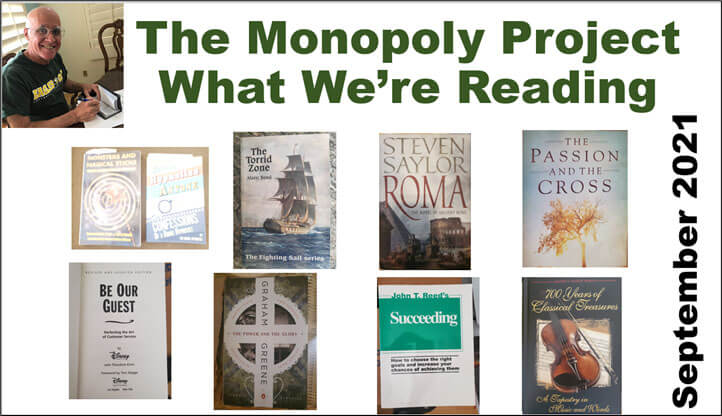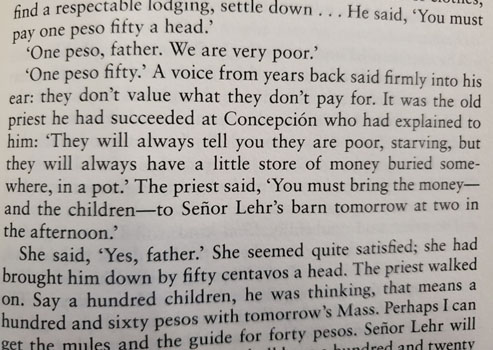Every month we show what is on our reading table.

Comments on current reads:
- “Monsters and Magical Sticks: There’s No Such Thing As Hypnosis?” (208 pages, paperback, reprint 2017) by Steven Heller and “How to Hypnotise Anyone – Confessions of a Rogue Hypnotist” (112 pages, paperback, reprint 2014) by The Rogue Hypnotist. I always thought that hypnosis was hokey fiction: “Breathe deeply, follow this watch, you are getting sleepy, when I snap my fingers you will bark like a chicken, when I count to three you will awaken with no memory.” But Scott Adams’ books and Robert Cialdini on “Persuasion” convinced me to give hypnosis a serious consideration.
- “The Torrid Zone” (300 pages, paperback, 2014) by Alaric Bond. I read and reviewed the first five books in this British Naval Fiction, “His Majesty’s Ship”, “The Jackass Frigate” True Colors”, “Cut and Run” and “The Patriot’s Fate”. I give them high marks. Now that I read the first five installment in the series, I like it even more. I learned that the author does not center the series and each book around the captain. All the other series are about the captain rising from humble or noble beginnings to the end of an illustrious career. In Bond’s world, he follows a cross section of the crew, from the lowest to the captain. You are never sure who will survive and who won’t. In the first book, the captain, who I liked, died at the very beginning of the climactic battle.
- “Roma” (555 pages, hardback, 2007) by Steven Saylor: This is the first book in the three part history of Rome; from founding to the last days of the empire. I found this book on research about the rise of Christianity during my review of Pastor Jeff’s recommendation, “The Rise of Christianity”. Saylor writes historical fiction. I have read and greatly enjoyed his “Sub Rosa” series of books about a ‘detective’ in Ancient Rome during the transition from Republic to Empire. Again, here he fictionalizes history while remaining true to the known, historical sources. He recounts the beginning of the history of Rome in the time of myths to the last days of Julius Caesar and the rise of his great nephew Octavian/Augustus. He inserts the two fictional families, the Pititi and the Pinari in the center of all the action. I am reading the three-book series, out of historical order; last first, then middle, next beginning.
- “The Passion and the Cross” (128 pages, paperback, 2015) by Ronald Rolheiser: “His beautifully written meditations on the passion and the cross invites you to a new understanding of redemption and offers insight into the meaning of your own loss and suffering. Take a journey into the deeper meaning of pain with guidance from a trusted spiritual advisor.”
- “Be Our Guest” (244 pages, paperback, 2011) by Disney. This has been ‘on the table’ four years. My daughter worked the summer at Christ Church in Phoenix in 2017. They use this book as a training tool on how to treat ‘guests’ at the church. Here is Executive Pastor Rev. Dr. Jeffery Schrank doing a Concordia University Irvine recruitment seminar in 2015:

- “The Power and the Glory” (240 pages, paperback, 1940) by Graham Greene: I am a big Graham Greene fan and am re-reading this book because it came up in a conversation about charging late fees at our medical practice, Ahwatukee Health and Recovery. We just started charging late fees and no-show fees since everyone was taking advantage of our mercy. In the book, the ‘whisky’ priest is advised that he should always charge for giving Mass and baptisms or the peasants will not appreciate the sacraments. Here (Part 3, Chapter 1, p169) he is bargaining on the price of baptisms:

- “Succeeding” (316 pages, paperback, 2011) by John T Reed. Reed is a noted real estate guru with a sharp wit and no uncertain opinions of other gurus. I had read the 2nd edition of this book 15 years or so ago. The 3rd edition is updated and most importantly has been rearranged to be more effective. John’s take on other guru’s is hysterical and correct. His real estate advice is sound although he does have a strange dislike of 1031 exchanges.
- “700 Years of Classical Treasures” (104 pages, hardback plus CD’s, 2005) by ‘Editors of Reader’s Digest’.
Not pictured above:
- “How To Retire Overseas” (352 pages, paperback, 2018) by Kathleen Peddicord. “Whether motivated by a desire for adventure, or the need to make the most of a diminished nest egg, more and more Americans are considering an overseas retirement. Drawing on her more than three decades of experience helping people relocate happily and successfully, Kathleen Peddicord shows how living in an unconventional retirement destination can cost less than a traditional home in Florida or Arizona.”
- “Fourfold Kingdom of God” (239 pages, paperback, 2020) by Gerald Paul Kooye: I bought this book after reading “The Holy Longing” based on a recommendation from the Stanford Magazine. The book looks at God’s kingdom from a mathematical and physics perspective.
- “The Encyclopedia of Commercial Real Estate Advice” (528 pages, hardback, 2020) by Terry Painter: Still in work. The few times I dipped into it; I was impressed. This is dragging on and it shouldn’t be. The content is interesting. We just closed one commercial loan refinance ($750K) and are working on another ($6M) so I should have some motivation.
- “Intercessory Prayer” (275 pages, paperback, 1996) by Dutch Sheets: I just started reading this. I have read the first two chapters. If the rest is as good, and as documented, this is an OUTSTANDING book on what is intercessory prayer and how to do it. I like his explanation of theology and how he backs each claim with scripture.
- “The Drama of Scripture” (272 pages, paperback, 2014) by Craig G. Bartholomew and Michael W. Goheen: Recommended by Pastor Jeff. I skimmed the first two chapters and really like this approach. Let’s see how it ends.
- “The One Year Bible” with help from the “Lutheran Study Bible“.
I did finish 2, 3, 5, 7, and 9. You will see and hear about those in our next Floating Book Review.
